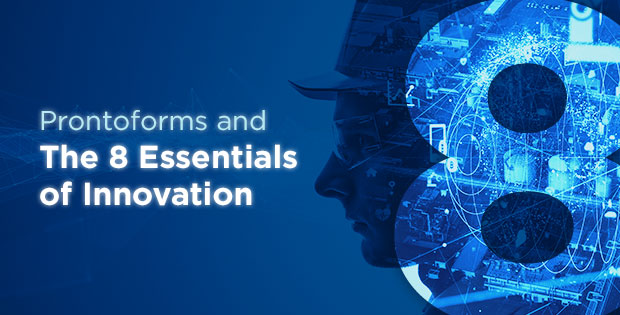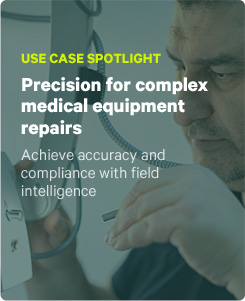
If times of crisis have a positive impact on businesses it is the resulting boon of inventive thinking. The COVID-19 pandemic is no exception.
How so?
As our governments, businesses, and social systems are altered, the dynamics of these disruption are, as a recent McKinsey report suggests: “…like adrenaline for innovation, causing barriers that once took years to overcome to evaporate in a matter of days. Entrenched orthodoxies on ‘the way things are done’ are replaced with ‘the new way we do things’ almost overnight.”
Harvard Business Review contributor, Larry Clark, surmises that:
“When we look back on the current health crisis, there’s no doubt we’ll learn that it resulted in a number of innovations: new drugs and medical devices, improved healthcare processes, manufacturing and supply chain breakthroughs, novel collaboration techniques.”
Advances in field services factor into this equation too. The pressures that come from changing customer expectations and surging demands for risk mitigation, widespread regulatory shifts, as well as a greater emphasis on automation, and digital transformation make innovation a competitive must.
When a crisis hits, Clark writes, we’re forced to “confront the truth about how our systems work (or don’t). The places where things could be done better or more efficiently become glaringly obvious. All of a sudden, opportunities for innovation are staring us in the face.”
Opportunities for innovation in field service
Field service teams can innovate in the throes of a crisis by adopting McKinsey’s “eight essentials” for innovation:
1. Discover
None of us knows what the post-pandemic world will look like. This uncertainty makes decision making difficult at best. Instead of relying on hunches, use data. Capture rich data with field apps and then connect analytics to track, leverage, and apply data to any innovation investments or upgrades to your processes.
As the McKinsey report notes, “entire organizations, from sales and customer service to marketing and operations, can be activated to monitor change and interpret its impact. Every customer touchpoint [think field services] is a new opportunity to learn. Having the ability to rapidly synthesize the many signals coming into an organization, recognize new patterns of customer behavior, and take action quickly can give companies a head-start in the innovation race.”
2. Evolve
The way we’ve operated historically may not fit with the revolutionary changes we’re seeing these days. Many, if not most, companies have no alternative but to adopt new models of service, health, and safety. There’s no time better than now to critically evaluate the actions we can take to evolve with the many changes brought about by COVID-19. Contactless delivery with pre-site checklists, for instance, align with 96 percent of businesses having evolved their go-to-market model since the pandemic hit, with the overwhelming majority turning to multiple forms of digital engagement with customers.
3. Choose
Take a look at your options. Smart mobile apps may have been on your radar at one time but took a back seat to something else. Use this time to reassess and reprioritize. Challenge the way you’ve always done things with initiatives and investments that offer opportunities to make improvements. Set the stage for continued prosperity and growth by looking at digitizing and streamlining workflows, to eliminate rote tasks, to diminish risks, enhance safety, and ultimately, elevate service efficiency, and compliance.
4. Aspire
Commit to prioritizing innovation that reframes your new strengths and weaknesses in a post-pandemic world. Some of your customers and competitors may be shifting to digital alternatives. A sub-set of your customers may prefer “old model, face-to-face interactions” that can now be packaged and offered “at a premium price.” Others may even want a combination of both.
Aspire to enhance your service delivery models with technologies and processes that differentiate your offering from competitors on a variety of fronts. In other words, reach for the stars.
5. Accelerate
There’s no arguing that the pace of change has accelerated exponentially. We’re seeing it in regulatory standards. It’s blatant in the medical sector where HVAC and medical device installation and maintenance services are facing unprecedented pressure. Agility and speed are more important than ever. You can respond to and capitalize on the latest market changes with service apps that can be rapidly iterated and deployed.
6. Scale
Put innovation to work in your organization with solutions that are easy to scale to tens or tens of thousands of people across your field services operation. These processes can also be scaled to other business divisions to achieve similar levels of innovation, allowing your entire company to keep pace with emerging needs.
7. Extend
Extend your current systems of record and software out into the field. But don’t reinvent the wheel. Maximize and broaden your existing tech stack by leveraging the hands-on knowledge of an experienced third-party vendor like ProntoForms. Think of it as a supportive extension of your internal IT resources.
8. Mobilize
Mobilize your team with apps that guide them step-by-step through complex processes that help solve problems quickly and that make your field service people look like super-heroes in front of customers. At the same time, mobilize the data collected by your people in the field to increase the pace of ideation, decision-making, and risk-mitigation.
Come what may with the pandemic, what we can all say with certainty is that we’re in an era ripe for novel thinking and doing.
Learn more about essential digital transformation
Discover the challenges facing today’s manufacturing leaders and gain insight into how they are remaining agile during COVID-19. We’re co-hosting a Virtual IdeaShare with Service Council on August 12th at 2pm EST. Join keynote speaker Jon Barr, CIO of KONE Americas, and attend virtual panels with Ryan Tidd, Engine Operations Capability and Innovation Director at Cummins, and ProntoForms’ VP of Operations and scaling expert, Aly Mawani. Register now!



